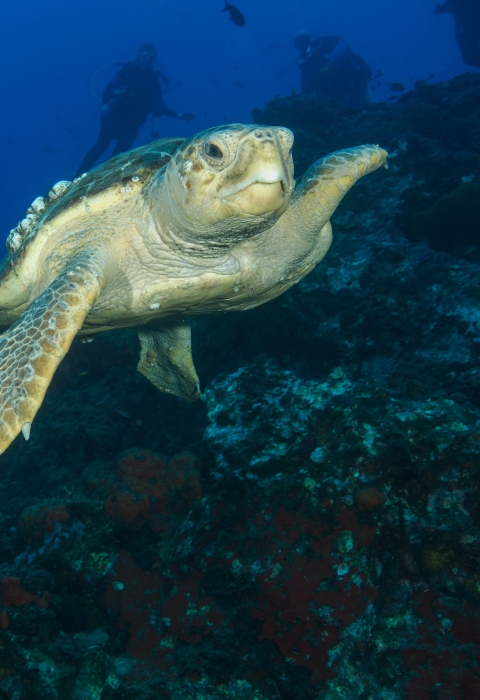The first injured sea turtles arrived Wednesday, December 21, at New Jersey’s new and only long-term sea turtle rehabilitation center, the Sea Turtle Recovery at Essex County Turtle Back Zoo in West Orange. The 10 Kemp’s ridley sea turtles were transported from the New England Aquarium in Massachusetts, where the season has already brought nearly 450 cold stunned sea turtles ashore in the state.
“For over 6 years I helped transport Sea Turtles that needed surgery or long term treatments as far as North Carolina to receive care,” said co-executive officer Brandi Biehl of the Sea Turtle Recovery non-profit organization. “Now, thanks to support from Essex County and the public, we can treat sea turtles right here in the state and provide assistance to other facilities in the Northeast that become overcrowded.”
As water temperatures rapidly drop this time of year in the Northeast (Virginia to Maine), especially in Cape Cod and Long Island, biologists and volunteers prepare for an average of over 570 sea turtles that are stunned by the cold, a reaction that can lead to frostbite, malnutrition, dehydration, shock, pneumonia and possibly death. Kemp’s Ridley, Loggerhead and Green Sea Turtles are susceptible to cold stunning if they do not head south by the time water temperatures drop. The new facility highlights a collaboration among Sea Turtle Recovery, NOAA Fisheries, U.S. Fish and Wildlife Service and the Essex County zoo to rehabilitate protected sea turtles.
“Sea Turtle Recovery will provide valuable rehabilitation space to accommodate an increasing trend in cold-stunned sea turtle strandings in our region, from Maine to Virginia,” said Greater Atlantic Region sea turtle stranding coordinator Kate Sampson of NOAA Fisheries. “An increase in rehabilitation capacity in our region means fewer turtles will have to be transported to the southeast region during the initial, critical stages of their medical care.”
In 2014, more than 700 live sea turtles washed ashore in the Northeast. Just six years ago, the five-year average (2006-2010) was 152 cold-stunned sea turtles. Eight facilities in the region have the capacity to care for cold stunned or injured sea turtles.
“Every sea turtle makes a difference in the survival of the species,” said the non-profit’s co-executive officer Bill Deerr. “We will be thrilled to watch our first patients head back into the ocean to thrive.”
All five species of sea turtles found in the Atlantic Ocean are threatened or endangered. They face many threats including fishing line entanglement, plastic ingestion, boat strikes, and are losing natural nesting and feeding sites because of coastal development.
“Sea Turtle Recovery now joins the volunteers and organizations that succeed in saving hundreds of sea turtles,” said regional recovery permit coordinator Deb Carter of the U.S. Fish and Wildlife Service. "Rescue, rehabilitation and release of sea turtles are not only opportunities to help populations, but also opportunities to better understand the challenges to recovering healthy population numbers."
At Essex County Turtle Back Zoo, an antiquated building was replaced with a modern 4,000-square-foot facility. The new building has five recovery tanks, life support systems, and an intensive care unit for more critically injured turtles. Zoo visitors will be able to see less critical patients while learning about the perils sea turtles face and what the public can do to help. Once the turtles have regained their health, they will be released back into their natural habitat.
“The new partnership with Sea Turtle Recovery will enable Turtle Back Zoo to enhance its mission of promoting conservation and preservation, while also creating an additional space to nurture and assist the zoo’s namesake animals,” said Essex County Executive Joseph N. DiVincenzo, Jr. “This project is a great example of how zoos and animal rescue organizations can work together to save animals and raise public awareness about dangers animals face.”
Sea Turtle Recovery (STR) is a 501(c)3 nonprofit dedicated to the rehabilitation, preservation and conservation of sea turtles. Its current work extends throughout the state educating the public about the ecological role of sea turtles, threats they face, and ways to protect their future. Now, with the building donation of Essex County Turtle Back Zoo, the Sea Turtle Recovery can begin to fulfill the other portion of its mission to rehabilitate sea turtles for release back into the wild.
More about the Sea Turtle Recovery can be found by visiting www.seaturtlerecovery.org. More information about the zoo can be found at www.essexcountynj.org/turtlebackzoo.


